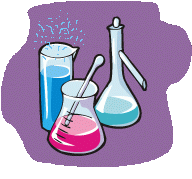


Experiments for 'potassium metabisulfite'
Below follows a summary of all experiments, matching your search. Click one of the EXPERIMENT hyperlinks for a complete description of the experiment.
![]()
Results for 'potassium metabisulfite':
EXPERIMENT 1
---------------
Manganese builds a coordination complex with EDTA, which appears to be
pink. What oxidation state does the manganese have with this complex? It
appears to have oxidation state 2, unless EDTA is easily oxidized by
manganese, having a higher oxidation state.
EXPERIMENT 2
---------------
Manganese (II) gives an off-white precipitate with ferrocyanide and it gives
a dark brown precipitate with ferricyanide. The brown compound probably is
a manganese (IV) compound, formed through oxidation by ferricyanide.
EXPERIMENT 3
---------------
This sequence of experiments shows that sulfite is capable of reducing
silver (I), copper (II) and iron (III), but that these reactions all
show their own peculiarities. Sulphur in the +4 oxidation state is a
mild reductant.
EXPERIMENT 4
---------------
Copper (II) is reduced by metabisulfite / sulphur dioxide to a copper (I)
compound, but some heating is required in order to make this reaction
fast.
EXPERIMENT 5
---------------
Molybdate forms blue or green compounds, when reduced with mild reducing
agents or when little quantitities of reducing agents are used.
EXPERIMENT 6
---------------
Vanadium pentoxide dissolves in concentrated sulphuric acid with some heating.
A deep red liquid is formed, which, remarkably, only is reduced by sulfite in
the presence of some water.
EXPERIMENT 7
---------------
Bisulfite and sulfite form coordination complexes with chromium (III). The
exact behaviour strongly depends on the pH of the solution.
When the pH is raised with sulfite and then decreased again with sulphuric
acid, then the color does not revert to the original color of aqueous
chromium (III). Probably a new compound is found, which is inert and does
not fall apart quickly in acidic environments.
EXPERIMENT 8
---------------
When dichromate is reduced with metabisulfite in acidic environment, then
a chromium (III) compound is formed, which does not easily crystallize
from the liquid as chrome alum. The chromium (III) compound is green,
instead of violet.
EXPERIMENT 9
---------------
Bismuth shows remarkable coordination chemistry with iodide and chloride.
In the absence of chloride, a black precipitate of BiI3 is formed. In the
presence of chloride, a deep yellow/orange compound is formed, but only
if also iodide is present. So this compound must be a complex of bismuth,
iodide and chloride.
EXPERIMENT 10
---------------
Sulfur is an extremely fascinating element in that it is capable of existing in
a wide range of oxidation states under normal conditions, from -2 (as in
Hydrogen sulfide) up through +6 (sulfuric acid). The following experiment
demonstrates simple redox chemistry involving Sulfur dioxide gas created in
situ.
End of results for 'potassium metabisulfite'
![]()